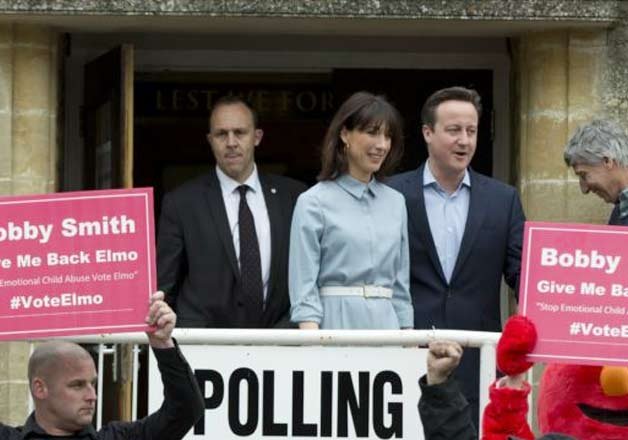
London: The Conservative Party fared much better than expected in British parliamentary elections Thursday, an exit poll projected, suggesting that Prime Minister David Cameron is within touching distance of forming a new government.
The opposition Labour Party of Ed Miliband took a beating, according to the poll, much of it due to the rise of the separatist Scottish National Party. The poll said the SNP would take all but one of the 59 seats in Scotland, most of them from Labour.
Cameron's coalition partner, the Liberal Democrat Party, was expected to lose most of its seats on a night that shook the grip of Britain's three biggest parties.
The exit poll, based on interviews with 22,000 voters, differed strongly from opinion polls conducted during the month-long election campaign, which had put the Conservatives and Labour neck-and-neck with about a third of the vote share each.
London Mayor Boris Johnson, who is running for a seat in Parliament as a Conservative, said that if the poll is accurate, "then obviously it's a very, very clear victory for the Conservatives and a very bad night for Labour."
Political leaders warned against jumping to conclusions before full results are in, and some expressed skepticism about the poll.
"I have to say it just doesn't feel right," said longtime Labour adviser Alistair Campbell.
Former Liberal Democrat leader Paddy Ashdown was equally skeptical, telling the BBC: "I'll bet you my hat, eaten on your program, that it is wrong."
But early results backed the poll's general trend: In the first constituencies announced, Labour gained some votes from the Conservatives but picked up fewer than needed from the collapse in Liberal Democrat support, and lost votes in some areas to the U.K. Independence Party.
The exit poll projected that the Conservatives would get 316 seats — up from 302 and far more than had been predicted — and Labour 239, down from 256. The Liberal Democrats would shrink from 56 seats to 10, while the Scottish nationalists would grow from six to 58, all but one of Scotland's seats.
If the exit poll is accurate, the Conservative Party would be in a commanding position to form the next government by seeking partners from smaller parties.
There could be a re-run of the Conservative-Liberal Democrat coalition that has governed since 2010. The poll put the two parties' total at 326 — just over half the 650 seats in the House of Commons.
Cameron could also seek support from the right-of-center Democratic Unionists in Northern Ireland, who had eight seats before the election, or the anti-European, anti-immigration U.K. Independence Party.
SNP leader Nicola Sturgeon tweeted that supporters should "treat the exit poll with HUGE caution. I'm hoping for a good night but I think 58 seats is unlikely!"
The chief exit pollster, John Curtice of Strathclyde University, said the methodology was the same as in 2010, when the poll turned out to be very accurate. He said it looked as if Conservative and Labour gains had canceled each other out across England and Wales, and that Labour had lost much of its support in Scotland to the SNP.
Curtice said the early results were "in line with the exit poll," adding that a Conservative majority couldn't be ruled out.
The survey was conducted by pollsters GfK and Ipsos MORI for Britain's broadcasters and released as polling stations closed and the counting began.
The seat of Houghton and Sunderland South in northeast England was the first to complete the traditional election-night ritual: Votes in each of the 650 constituencies are counted by hand and the candidates — each wearing a bright rosette in the color of their party — line up onstage as a returning officer reads out the results. Houghton and Sunderland South went to Labour, as expected.
UKIP ran third in opinion polls, but the exit poll predicted it would win just two seats because its support isn't concentrated in specific areas.
Leader Nigel Farage has said he will resign if he does not win the seat of Thanet South — an outcome that looked a distinct possibility as the votes were counted.
All day across the nation of 64 million people, voters streamed to schools, churches and even pubs for a say in their country's future. About 50 million people were registered to vote, and turnout appeared to be high.
The carefully stage-managed campaign had lacked impromptu drama, but many voters felt that the stakes were high in an election that shattered the dominance of the major parties.
"This is the most exciting election I can remember," said Lesley Milne, a 48-year-old from Glasgow. "It's time to shake up the politicians in London and the SNP are the people to do it."
Television debate appearances in which the public put questions directly to the politicians made plain that many distrust promises to safeguard the economy, protect the National Health Service from severe cutbacks and control the number of immigrants from eastern Europe.
Britain's economy — recovering after years of turmoil that followed the 2008 financial crisis — was at the core of many voters' concerns.
In Whitechapel, one of London's poorest communities that is home to a large ethnic minority population, voters struggling in the wake of the worst recession since the 1930s wanted a change in leadership.
"The first priority is the economy, the second one is creating more jobs, and the third is living expenses — they're going higher and higher," said Shariq ul-Islam, a 24-year-old student of Bangladeshi descent.
Just a few minutes away is the City of London, the traditional financial district where many bankers earn salaries that their Whitechapel neighbors can only dream of.
Here, Christopher Gardner, a 34-year-old finance industry official, had trust in the Conservatives.
"There are some issues that have been caused by austerity previously," he said. "They're the only people that I'm confident will resolve that."





















